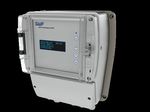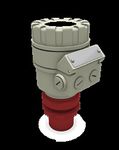Q-Eye Radar - GWF Technologies
←
→
Page content transcription
If your browser does not render page correctly, please read the page content below
Water
Q-Eye Radar
Stationary non-contact flow meter for open
channels and partially filled pipes
Your benefits Features
■ Non-contact measurement of flow and level: ■ Compact aluminum housing, IP66 (NEMA 4)
No contact with fluid during installation, no ■ Radar-based velocity sensor
sensor fouling or need for regular cleaning
■ Ultrasonic, radar-based or hydrostatic level sensor
■ Easy mounting during continuous process:
Minimize installation costs and duration ■ Non-contact flow and level measurement
■ Platform-independent web interface for ■ Measurement of low velocities down to 0.02 m/s
configuration, operation and maintenance: ■ Bi-directional measurement over the entire flow range
Easy and fast setup with multi-language
graphical user interface. Parametrization ■ Accuracy velocity:
with any mobile device, no software needed ■ RV11: +/- 0.5% FS
■ RV24: +/- 1% of reading
■ Integrated Wi-Fi access point and LAN
interface, optional mobile connection: ■ Accuracy flow: Typically < 5% of reading
Efficient system integration, real-time ■ Integrated Wi-Fi access point
remote access anytime and anywhere
■ Graphical user interface in multiple languages
■ Adaptable to surcharge conditions:
Combine radar measurement with ■ All units for display and data storage can be customized by the user
submersible pressure transducer ■ Preselection of typical cross sections or user-definable irregular shapes
■ Analog inputs for external sensors (2-wire loop-powered)
■ Multiple analog and digital outputs, user programmable
Application ■ Communication: Ethernet, Modbus RTU/TCP, optional 4G/3G/2G modem
■ Power supply: 100-240 V AC or 9-36 V DC
■ Open channels or partially filled pipes
■ Ideal for harsh environments and heavily
polluted water
■ Continuous flow monitoring in: Options
■ Wastewater treatment plants
■ Wastewater collection systems
■ Two radar velocity sensors suited for wastewater or hydrological applications
■ Storm water runoff monitoring
■ Urban drainage ■ Choice of ultrasonic, radar-based or hydrostatic level sensors
■ Industry
■ Additional pressure transducer for surcharge conditions
■ Hydrological applicationsProduct description
The Q-Eye Radar flow meter is designed for stationary flow monitoring of
slightly to heavily polluted media in open channels or partially filled pipes.
Q-Eye Radar is an exceptionally versatile flow measurement system designed for
continuous operation and suitable for application in wastewater and storm water
sewers as well as open channels and rivers. Compact construction combined
with the non-contact measurement principle enables an easy installation and
use. Additionally, the Q-Eye Radar measures bi-directional flow over the entire
measurement range and near zero flow velocities down to 0.02 m/s.
Q-Eye Radar with radar and level sensor
WebUI (Wi-Fi) Measuring principle
The Q-Eye Radar is equipped with an integrated For strongly polluted media or challenging installation sites, a non-contact
web server running a WebUI. You can display measurement is often the method of choice. As the Q-Eye Radar system can
and manage the WebUI using the standard be mounted outside of the medium, your personnel will not get in contact with
web browser of your smartphone, tablet PC or the polluted fluid during installation. Furthermore, the need for maintenance
notebook. There is no need for any additional caused by sensor fouling or deposits is eliminated.
software or App. Parameter setting and data
visualization has never been so easy. By combining both a radar velocity and a water level sensor, the Q-Eye Radar
provides a revolutionary approach to open channel and wastewater flow moni-
toring.
The velocity sensor sends a radar signal at an angle of approximately 55° to
the surface of the water. The signal is then reflected back to the sensor. The
local flow velocity can be measured based on the Doppler shift of frequency
between the initially emitted and the reflected signal.
The level sensor is used to measure the height of the water at the exact point
where the surface velocity was determined. Q-Eye Radar calculates the area
Data storage and trans- and total discharge based on the user-definable channel profile.
mission
Combine the Q-Eye Radar with a 4G/3G/2G cel-
lular modem for automatic data transmission. The
logged data can be sent to any host computer (FTP
server) or to the GWF web-based cloud solution
at a user-selectable interval (e.g. 4 times a day,
once a day or once a week). Alternatively, wire-
less LAN and Ethernet connections are available.
Information on level, velocity, flow and signal
strength can be taken at regular intervals
between 1 minute and 60 minutes. In case of
a flood event, the logging can be set automa-
tically to one minute (event mode). The Q-Eye
Radar is equipped with internal storage capacity
(16 GB) and will store data for up to 18 months.Component description
The Q-Eye Radar system is composed of a wall-mounted transmitter, a radar velocity sensor and any level sensor (ultrasonic, radar
or pressure). For surcharge conditions, submersible level sensors are available.
Transmitter
The Q-Eye Radar transmitter incorporates all the required algorithms and
software to ensure measurement accuracy and repeatability. The IP66 (NEMA
4X) compact housing features a 4 x 20 alphanumeric LCD display and a 4
button keypad.
All configuration data as well as measured and calculated data are stored
inside a 16 GB Micro-SD card. The transmitter controls the measurements,
Wall-mounted transmitter
calculates the flow rate and provides freely programmable current outputs,
status alarms, frequency outputs and totalizer readings.
The Q-Eye Radar is designed to accept any depth sensor (ultrasonic, radar and
pressure) with an analog input (4-20 mA). Our Q-Eye Radar transmitter offers
the best in wastewater measurement.
Velocity and level sensors
RV11 radar RV24 radar The radar velocity sensors are operating at the free 24 GHz band frequency and
velocity sensor velocity sensor make use of the Doppler effect to gain information about the speed of the mo-
ving surface. The sensor does this by beaming a microwave signal to the flow
surface at a defined angle and analyzing the signal reflection from particles and
disturbances moving with the flow. The frequency of this returning signal has
been shifted by an amount directly proportional to the spot velocity.
The ultrasonic level sensor operates by energizing a piezoelectric transducer
with an electronic pulse. This pulse creates a pressure wave that travels to the
Radar or ultrasonic level sensor flow surface and is partially reflected back to the transducer. The signal time of
flight to the flow surface and back is recorded. The actual distance is calcula-
ted knowing the speed of sound at the site, which is corrected by an embedded
temperature sensor.
Alternatively, the system can be equipped with an additional radar water level
sensor, which is independent of ambient air temperature.
Surcharge level sensors
For some applications, flow conditions change from open channel flow to
surcharged conditions (e.g. in sewers). Down-looking level sensors cannot
provide information when submerged. Consequently, Q-Eye Radar can be
equipped with an optional depth sensor (pressure transducer) which provides
Pressure level continuous measurement in surcharge events.
sensorTechnical data
256
Transmitter Q-Eye Radar
Display 4 lines, 20 characters
230
4x
6,4 Keyboard 4 keys
Datalogger 16 GB Micro SD card
Communication RS-485, Modbus (RS-232 or RS-485), Wireless LAN,
239 4G (LTE) / 3G (HSPA+) / 2G, Ethernet 10/100 Mbps
270
RJ45 (IP65)
Inputs max. 4 x 4-20 mA, 2 x digital
Outputs max. 4 x 4-20 mA, 4 x relay, 2 x digital
Power supply 9-36 V DC or 100-240 V AC (50/60 Hz)
1x M16x1.5 (IP68)
Approval IP66 (NEMA 4)
1x M20x1.5 (IP68) 3x M16x1.5 (IP68)
Enclosure Aluminum
Operating temperature - 68 °F to + 140 °F
Storage temperature - 68 °F to + 158 °F
Dimensions 270 x 256 x 139 mm (L x W x H)
33
30 30 30 30 30
Werkstückkanten DIN 6784
Tolerierungsgrundsatz DIN ISO 8015 Allgemeine Maßstab: 1:5 Gewicht:
Oberfläche
Toleranzen
ISO 2768 DIN ISO
Alle Angaben in Millimetern -mH- 1302
Werkstoff: AC-AlSi 12 Dicke:
Gewicht in Kilogramm
h 2016 Datum Name
g Bearb. 17.02. sd
f Gepr. Gehäuse Übersicht NOVO Serie
e Norm
d
c
Blatt 1/1
b HYD 600 0200 000
a A3
Änderung Datum Schutzvermerk DIN 34
Radar velocity sensor RV11 RV24
Preferred application Wastewater Hydrology
Frequency 24 GHz 24 GHz (K-band)
Beam width 11° (-3 dB) 12° Azimuth, 24° Elevation
Range ± 0.05 m/s to ± 15 m/s ± 0.02 m/s to ± 15 m/s
Resolution 1 mm/s 1 mm/s
min. wave height 3 mm min. wave height 1 mm
Accuracy Velocity ± 0.5 % FS ± 1 % of reading
Accuracy Flow typically < 5 % of reading, typically < 3 % of reading,
depending on site conditions after calibration
Measurement interval continuous (every second) continuous (every second)
Min. distance to surface 0.2 m 0.5 m
Max. distance to surface 10 m 50 m (radar beam to water)
20 m (height above the water)
Integrated angle compensation – from 30° to 70°
Protection class IP68 (48 h at 50 kPa, NEMA 6P) IP68
Operating temperature - 104 °F to + 185 °F - 104 °F to + 185 °F
Dimensions 242 mm (L mounting), 110 x 90 x 50 mm
100 x 100 mm (W x H sensor)
Q-Eye Radar is available with a variety of ultrasonic and radar down-looking level sensors as well as a submersible pressure level
sensor. Please consult the separate brochure for further details on the depth sensors.
Headquarter Sales
GWF MessSysteme AG GWF Technologies GmbH T +49 8341-959990
Obergrundstrasse 119 T +41 41 319 50 50 Gewerbestraße 46f info@gwf-technologies.de
6005 Lucerne, Switzerland info@gwf.ch, www.gwf.ch 87600 Kaufbeuren, Germany www.gwf-technologies.de
Subject to modification, 04.01.2021 – EPe60107You can also read
























































